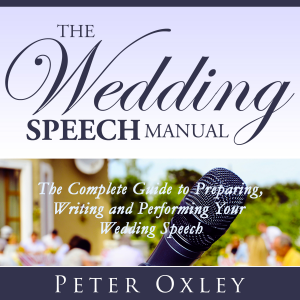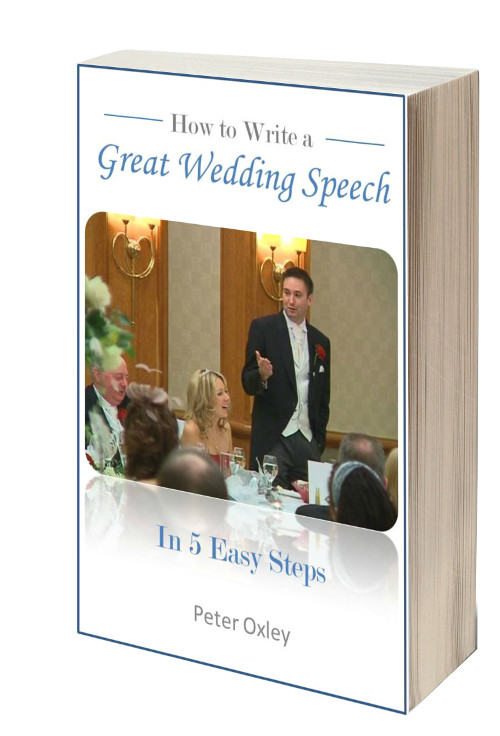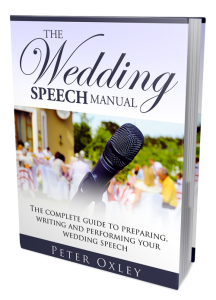10 Biggest Wedding Speech Lies
 When it comes to wedding speeches, everyone has advice to give. While most of it is well-meaning, a lot of it can be unhelpful and even completely untrue. Here I expose the biggest lies, so you don’t have to worry about being led astray by them.
When it comes to wedding speeches, everyone has advice to give. While most of it is well-meaning, a lot of it can be unhelpful and even completely untrue. Here I expose the biggest lies, so you don’t have to worry about being led astray by them.
1. My friend wrote his the night before
The number one biggest lie told about wedding speeches. If someone tries to sell you this line, please just walk away, laugh in their face, or just plain ignore them. Whatever you do, don’t listen. People who claim this are either liars or the producers of substandard speeches. Either way, they’re not worth a minute of your time.
2. Best speechmakers are people who are confident / brash in normal life
We all know someone who is always the life and soul of the party, always with something witty to say and never phased by talking in front of crowds. Wouldn’t this person be the ideal person to deliver a speech?
This is not necessarily the case. It’s surprising how sometimes the very people you think would naturally do a great job actually don’t, while other, quieter, people surprise you. The difference? Practice.
3. A skill that can’t be learnt – you either have it or you don’t
This links to the above and is one of the biggest myths of public speaking; usually peddled by snobbish professional speakers who want to ensure they keep their monopoly.
The truth is that anyone can stand up in front of a crowd of people and deliver a speech which is interesting, engaging and amusing, and delivered in a clear, concise, professional manner.
The secret? The right material and plenty of practise. See The Wedding Speech Manual for more on both of these.
4. Don’t make eye contact when you speak
This is something I remember being told at school, and realising it was wrong was one of the biggest revelations of my professional life. The idea was that if you’re nervous you should focus on the back of the room, avoiding all eye contact.
Wrong. Make eye contact with your audience, lots and often. Doing this will reassure you that they are human after all, reduce your nerves, and draw them in to what you’re saying.
5. A little Dutch Courage can’t hurt…
“Laydeesh an gennelmen… Really pleased to be (hic) speaking to you…” (rifles through notes, drops half on floor, spends a minute trying to pick them up) “I…” (swaying slightly, looks sick).
Need I say more? This may be a good comedy opener, but if you actually do slur your way through the whole speech then you’ll get no thanks from anyone.
6. You should have the full speech in full in front of you
Full written notes are a useful tool for the nervous or inexperienced, but can actually end up harming your chances of being fluent and confident on the day. Unless you’ve memorised the words, you’ll probably lose your flow every time you look up to make eye contact.
But if you have memorised the words, then why do you need to keep checking your notes anyway? I recommend the use of prompt cards – short notes to help if you lose your flow, but not too much that it distracts you. See here for more information on this and other effective presentation techniques.
7. You have to know the speech off by heart
In contrast to the above, some inexperienced public speakers will look at how the professionals hardly ever seem to refer to their notes and conclude that the only option is to have every word committed to memory.
This is also not true. Actors in plays or films need a script; you don’t.
The important thing is that you cover the key messages, saying something which flows in an interesting and engaging way. You already have the skills to do this: think about the last time you told a story, whether it was about something that happened at work, an amusing night out or a weekend away.
This is what you should aim to achieve. In terms of notes, just make sure you have the key points, to remind you what you need to cover.
8. Best men have to humiliate the groom
The best man is the light relief, and the one real opportunity for the groom’s true story to be aired at the wedding. Humour is expected, and certainly in anglophile cultures an element of ribbing is expected. Remember though that there’s a difference between humour and humiliation. Humour good, humiliation bad. If the groom really won’t see the funny side, best to not say it: remember, it’s his special day too.
There’s a line here – by all means approach it, flirt with it. Just don’t cross it.
9. The day will be ruined if the speeches don’t go well
It’s easy to over exaggerate the importance of the speeches when you’re one of the speech makers. However, you should keep things in perspective.
The wedding isn’t just about the speeches. There are plenty of other, more important, things on the day. Like the ceremony. Like the bride’s dress. Like the catering, and the entertainment, and…
Need I go on? Yes, you should take it seriously and prepare properly. But keep it in perspective: don’t get worked up with nerves by thinking that your speech is the most important thing happening that day.
10. You must be funny
A big part of the dread felt around wedding speeches is the fear of not being funny.
The father of the bride and the groom can relax a little here as I have some good news for you – you don’t have to be funny. Be yourself, say the right things (particularly about your daughter / bride) and you’ll be fine. If you’re able to slip in some funny lines, that’s a bonus.
As for the best man – sorry, but as I said above you’re the “light relief”: so you’re going to have to be at least a bit amusing…






